Once known for 'three strikes' law, California is now embracing criminal justice reform
Transcription
https://www.usatoday.com/story/news/politics/2019/09/18/about-californias-criminal-justice-reform-bills/2353853001/
Once known for 'three strikes' law, California is now embracing criminal justice reform
Gabrielle Canon | USA TODAY
Published 6:37 PM EDT Sep 18, 2019
Asia was only 3-years-old when her parents went to prison, convicted on first-time drug charges. She would spend the next four years waiting for her mother, Ashleigh Carter, to be released, allowed only short visits every few months.
Meanwhile, Asia and her disabled grandmother — both of whom had been in Carter's care — struggled in her absence. They lived in a shelter after surviving a violent break-in. Asia struggled with self-esteem, was bullied by other kids, and grappled with the fear and trauma that comes with family separations.
Asia and her mother shared their stories with California lawmakers this year, in support of a Senate Bill 394, which enables parents and primary caregivers for a child under the age of 18 who are charged with nonviolent felonies and misdemeanors to opt into programs instead of imprisonment.
It is one of several newly passed criminal justice reform bills now awaiting Gov. Gavin Newsom's signature.
Others include:
Senate Bill 136, which puts an end to sentence enhancements that automatically add an extra year for anyone convicted of recommitting a felony for which they had already served time
AB 1331, which will increase research and improve record-keeping in the criminal justice system
AB 32, which effectively ends the era of California’s reliance on private, for-profit prisons, including ICE detention centers.
Building on a series of reforms enacted in recent years that aim to reduce numbers in the state’s overcrowded and overwhelmed prison system, the changes mark a shift away from the tough-on-crime punitive policies of the past.
Ashleigh Carter and her daughter, Amara, advocate for California Senate Bill 394 at the California State Capitol on behalf of #cut50 in Sacramento, Calif.
Courtesy of #cut50
Previous policies pushed system past its limit
“California was an early adopter of mass incarceration,” said Sen. Scott Wiener, a Democrat who represents San Francisco and who authored Senate Bill 136.
“We led the country in building prisons and increasing sentences," he said. "Even with that quadrupling of the prisons we still had prison overcrowding because we adopted such harsh sentences and sentence enhancements.”
Roughly 80% of prisoners have had their sentences enhanced, and for more than a quarter of those, it has happened multiple times. According to the California Department of Corrections and Rehabilitation, more than 11,000 people currently behind bars have had an arbitrary year added to their sentences because of the enhancement laws.
The practice comes at a high cost — the state spends roughly $80,000 a year to lock up a prisoner, a figure that multiplies as enhancements are added. Senate Bill 136 ends the practice, and according to an analysis by the Department of Finance, California will save $20.5 million in the first year of implementation. The savings are projected to increase each budget year to $43 million in 2021-22 and $68.5 million in 2023-24.
Passage was hard-won. SB 136 achieved a narrow victory, passing 41-37 in the Assembly, and 22-16 in the Senate.
“Law enforcement fought us tooth and nail,” Wiener said, adding this was only the second time sentence enhancements have been repealed in the state. A similar bill, introduced last session, didn’t pass.
"I wasn’t the only one who didn’t like it," said Assemblymember Jim Cooper, a Democrat representing the Sacramento area, who did not vote for the bill. A former captain for the Sacramento County Sheriff's Department, Cooper scored an 85% rating from the National Association of Police Organizations for pushing back against several reforms that would get people out of prisons.
"If this bill is signed by the governor, it will potentially give those repeat offenders a pass on that one-year enhancement," he said. "Judges are in a much better position to make a decision on that than the legislature."
Movement away from 'three strikes'
California voters overwhelmingly approved one of the nation's first “Three Strikes and You're Out" laws in the mid-'90s, which landed some in prison for life if they were charged after having two previous conviction. By 2007, the state counted more than 173,000 prisoners, a 740% jump in just three decades.
After a series of lawsuits, in 2009 federal judges ruled that the state’s system was so overcrowded it was unable to provide constitutionally required care for prisoners.
By 2011, when the Supreme Court stepped in and ordered the state to bring its numbers down, the prison population was at 162,000, close to 180% of what the system was designed to hold.
Now, prisons are holding at roughly 135% of capacity. Officials credit policy changes with the drop. The state successfully enacted several reforms, through both the legislature and the ballot box. Proposition 57, which provided incentives for rehabilitation program participation inside prisons, alone resulted in a reduction of 10,600 in the average daily prison population over the next three years, due to good time, early-release credits.
Advocates emphasize that there's also been changes in the way criminal justice is discussed — and that's largely what is driving the shifts in policy.
The organization behind last year's bipartisan federal prison reform, #cut50, has joined with other grassroots organizers to put a face to the issues with personal stories from those who are most impacted.
Statistics and stories spur change
"A lot of the prior law and order and criminal justice policy comes from faulty storytelling," said Erin Haney, Senior counsel at #cut50, explaining that now they are working to change the narrative. “We are now starting to look at what justice means, and that is very different than solely relying on our long history of thinking of justice as exclusively punishment.”
Carter, a partner with the group's Empathy Network, an initiative that gives a platform to those impacted by the incarceration system, used her story to advocate for Senate Bill 394.
Ashleigh Carter, her daughters Asia and Amara and her mother at the 2019 Los Angeles Day of Empathy powered by #cut50.
Provided by #cut50
"When my daughter Asia was born I held her in my arms, looked her in the eyes, and swore to her that I would protect her with every fiber of my being," Carter said through tears during her testimony during a California Senate Public Safety Committee hearing. "I promised her that she had nothing to be afraid of because Mama would take care of her and never leave her side — and I lied."
It's been 10 years since, but they say their family still hasn't recovered. That's why Carter said she decided to share her story, in an effort to convince lawmakers to give parents — and their kids — a chance at a better life.
Senate Bill 394, The Primary Caregiver Pretrial Diversion Act, enables parents and primary caregivers for a child under the age of 18 who are charged with nonviolent felonies and misdemeanors to opt into programs instead of imprisonment.
Authored by state Sen. Nancy Skinner, a Democrat who represents the East Bay, the bill is intended to help the millions of children negatively impacted when a parent goes to prison, and ensure families aren’t separated by the system. It would create a pretrial diversion court that redirects parents or caregivers with dependent children into programs, including counseling, drug, and alcohol treatment, and career, parenting and financial classes to help them get back on track.
The California District Attorneys Association, the California Police Chiefs Association, and the California State Sheriffs’ Association all fought the bill.
Calling it a "new pretrial diversion scheme," The California District Attorneys Association wrote that it would single "out one class of individuals for disparate treatment under the law; allowing those who provide primary care for children, financially or otherwise, to avoid accountability for their crimes.”
The group added that it would make it “difficult and potentially impossible to prosecute years later when witnesses move, lose interest, or suffer memory loss as the case ages with no movement toward resolution if the person fails the diversion program.”
Cooper, speaking about the reforms generally, questioned whether the new bills will achieve their aims without negative consequences.
"At some point, the cost of keeping repeat offenders in prison can’t be outweighed by what’s good for the victims," he said. "The victims are the ones who will get hurt here."
“Accountability is still important,” Wiener responded, adding that, for his bill, it was not about eliminating jail sentences, but more addressing “outrageously long jail sentences.”
Wiener sees this as only the beginning.
“I think we are moving in a positive direction,” Wiener says, adding that, over the past few years the legislature has achieved important reforms. “We have made a lot of changes — but we have a lot more work to do.”
Samuel Metz of The Desert Sun contributed to this story.
Published 6:37 PM EDT Sep 18, 2019
---
https://www.sbsun.com/2019/08/27/pass-sb136-to-curb-mass-incarceration-remove-arbitrary-enhancements/
THE SUN
Pass SB136 to curb mass incarceration, remove arbitrary enhancements
Reporters inspect one of the two-tiered cell pods in the Secure Housing Unit at the Pelican Bay State Prison near Crescent City, Calif., Wednesday, Aug. 17, 2011. State prison officials allowed the media to tour one of the state’s most secure housing unit, known at the SHU, where inmates are isolated for 22 1/2 hours a day in windowless, soundproofed cells. (AP Photo/Rich Pedroncelli)
By The Editorial Board | opinion@scng.com |
PUBLISHED: August 27, 2019 at 12:00 pm | UPDATED: August 27, 2019 at 4:58 pm
California’s criminal justice system must be predicated on effective, evidence-based approaches to crime and justice.
By this simple standard, many sentencing enhancements currently used by the criminal justice system fall short. Such enhancements, which are applied for various reasons, increase the periods of incarceration for people convicted of criminal offenses.
One common enhancement used in California is a required one-year enhancement for each prior separate felony conviction resulting in incarceration.
As Sen. Scott Wiener, D-San Francisco, notes, “This single enhancement, applied wholesale and scattershot, is a massive driver of prison and jail populations and associated costs to taxpayers and to the families of incarcerated Californians.”
Indeed, there is little evidence that this particular enhancement benefits public safety. Unlike enhancements targeting more specific behaviors, including a history of violent offenses, the one-year enhancement as far as anyone knows only serves to keep people behind bars longer.
Related Articles
Pension obligation bonds are a poor fix for pension debts
Rogue rehab facilities need state oversight: Cottie Petrie-Norris
Later school start times won’t help students: Letters
Trump’s threats on California’s highway money highlight flaws of road funding system
When does age matter when picking presidents?
As the National Research Council concluded in 2014, “because recidivism rates decline markedly with age, lengthy prison sentences, unless they specifically target very high-rate or extremely dangerous offenders, are an inefficient approach to preventing crime by incapacitation.”
Considering that California’s per-prisoner spending is now over $80,000 per year, and that California must continue to limit its prison population due to a United States Supreme Court decision, it’s important that California pursue policies grounded in evidence.
Eliminating this enhancement, as Sen. Wiener’s Senate Bill 136 would do, will remove an arbitrary enhancement and save resources better spent on crime reduction and prevention. According to the state’s Department of Finance, the change could save tens of millions of dollars a year. That’s money that should be spent on crime prevention and recidivism-reduction efforts.
Weighing the costs and benefits of enhancements, it is essential to the creation of a criminal justice system that works that it keeps the public safe while optimally using finite resources. For these reasons, we support SB136.
Tags: editorials
The Editorial Board
The editorial board and opinion section staff are independent of the news-gathering side of our organization. Through our staff-written editorials, we take positions on important issues affecting our readership, from pension reform to protecting our region’s unique natural resources to transportation. The editorials are unsigned because, while written by one or more members of our staff, they represent the point of view of our news organization’s management. In order to take informed positions, we meet frequently with government, community and business leaders on important issues affecting our cities, region and state. During elections, we meet with candidates for office and the proponents and opponents of ballot initiatives and then make recommendations to voters.
View Comments
Join the Conversation
We invite you to use our commenting platform to engage in insightful conversations about issues in our community. Although we do not pre-screen comments, we reserve the right at all times to remove any information or materials that are unlawful, threatening, abusive, libelous, defamatory, obscene, vulgar, pornographic, profane, indecent or otherwise objectionable to us, and to disclose any information necessary to satisfy the law, regulation, or government request. We might permanently block any user who abuses these conditions.
If you see comments that you find offensive, please use the “Flag as Inappropriate” feature by hovering over the right side of the post, and pulling down on the arrow that appears. Or, contact our editors by emailing moderator@scng.com.
blog comments powered by Disqus
---
https://theappeal.org/california-has-a-chance-to-repeal-a-building-block-of-lengthy-prison-sentences/
THE APPEAL
California Has a Chance to Repeal a Building Block of Lengthy Prison Sentences
Vaidya Gullapalli August 28, 2019
Spotlights like this one provide original commentary and analysis on pressing criminal justice issues of the day. You can read them each day in our newsletter, The Daily Appeal.
The “tough on crime” era in California, as across the nation, included reaching repeatedly for draconian sentencing laws. Consequences have been evident in the state’s prison overcrowding crisis, which the United States Supreme Court found caused “needless suffering and death”; its sentencing laws, which still include over a hundred sentence enhancements; and in communities where generations of children and parents have suffered lasting separation.
But California, where crime is at historical lows, has been the site of significant criminal justice reforms in recent years. These have included efforts to roll back or modify some of the sentence enhancements that have contributed to lengthy sentences. Nearly 80 percent of people held in California state prisons have been affected by sentence enhancement. Over a quarter had three or more.
The most notorious of California’s sentencing enhancements is the “Three Strikes and You’re Out” law, passed by voters in 1994, which imposed a life sentence for almost any conviction, if a person had at least two prior convictions for crimes defined as serious or violent. Proposition 36, enacted by voters 18 years later, did away with the harshest consequences of the law, when it eliminated life sentences for non-serious, nonviolent crimes and established a procedure for people sentenced to life in prison to petition in court for a reduced sentence.
Right now, a bill making its way through the state legislature would do away with one of the most commonly used enhancements—a year that can be added to any felony sentence for any previous felony conviction that resulted in a sentence of prison or jail time, regardless of the length or the nature of the prior or current convictions. Senate Bill 136 passed the Senate this session. Emily Harris, interim policy manager with the Ella Baker Center for Human Rights, told the Daily Appeal that it must move out of the Assembly Appropriations Committee by Friday in order to have a chance of becoming law this year.
Supporters of the bill say the enhancement at issue, although discretionary, affected one-third of people convicted in 2017. More than 10,000 people in California prisons are serving sentences that were affected by this enhancement. This does not reflect the effect of the law on the large numbers of people serving felony sentences in jails, under realignment.
One notable element of the one-year enhancement is the fact that it only applies to people whose previous felony convictions were punished with jail or prison sentences, and not probation. Harris argues that this bestows another relative advantage on people whose wealth, resources, access to legal counsel, or whiteness, made them likely to receive less harsh sentences for the same crimes—and conversely, another disadvantage on the low-income people of color who are overrepresented in California prisons and jails. The threat of enhancements can, of course, also be deployed during plea negotiations, just another element of prosecutors’ arsenal for extracting convictions and prison sentences.
A recent press conference held by supporters of SB 136 featured an art installation at the state Capitol depicting “What a Difference a Year Makes.” The exhibit included the family milestones that people missed during just one year of incarceration: the birth of their first child, graduations, holidays, and deaths in their families.
James Vick was one of the people in prison quoted in the display. He said, “One year in this awful place can easily become a lifetime of misery, heartache, loneliness, pain, and uncertainty—because someone felt that a one-year enhancement was ‘only a year.’”
Other people shared their thoughts on what gaining a year of freedom could mean to them. They described how they would spend time at the bedsides of relatives fighting cancer, have the chance to raise their children so they could avoid the cycle of incarceration, and invest in themselves, their families, and their communities.
The gains would also be financial. A recent analysis of SB 136 by the state Department of Finance found that, if passed, the bill would save the state over $20 million in 2020-21. Savings would exceed $40 million the following year, and pass $60 million the year after that.
The organizations sponsoring the bill are the ACLU of California, California Coalition for Women Prisoners, Californians United for a Responsible Budget, Coalition for Humane Immigrant Rights, Drug Policy Alliance, Ella Baker Center for Human Rights, Friends Committee on Legislation California, Legal Services for Prisoners with Children, Pillars of the Community, and Tides Advocacy. (The Appeal is a project of Tides Advocacy.)
Law enforcement groups have lined up in opposition to the bill. These include the California District Attorneys Association, the California Police Chiefs Association, and the California State Sheriffs’ Association.
Harris described the efforts in recent years to reverse the many policies that created California’s mass incarceration crisis. Even if SB 136 is passed, she emphasized, there is more work to be done. “We have been able to build and gain momentum around having the voters and legislators recognize the harm that imprisonment has caused, but we’re only at the beginning of the reversal. Mass incarceration was hundreds of thousands of policies and choices. There’s going to have to be thousands more decisions made to reverse them.”
Other posts by this author
|
2023 may 31

|
2023 apr 5

|
2023 mar 19

|
2023 mar 5

|
2023 mar 5

|
2023 mar 5

|
More... |

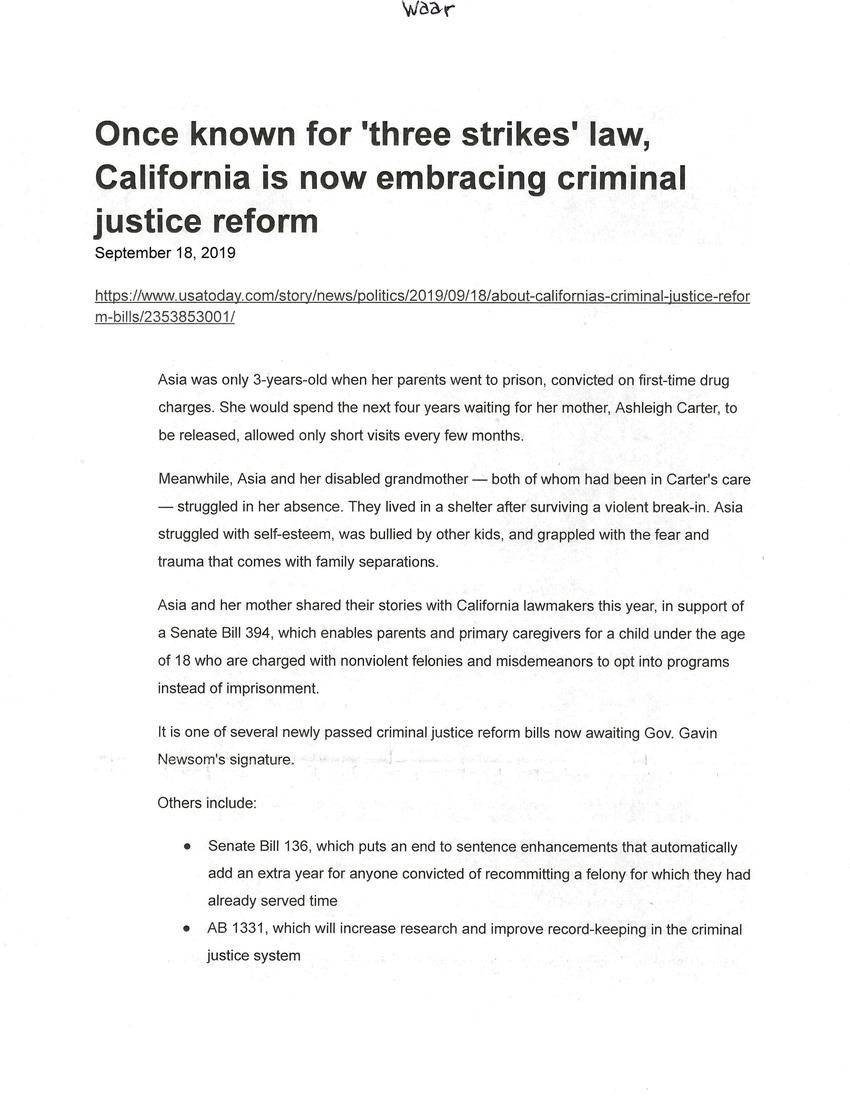
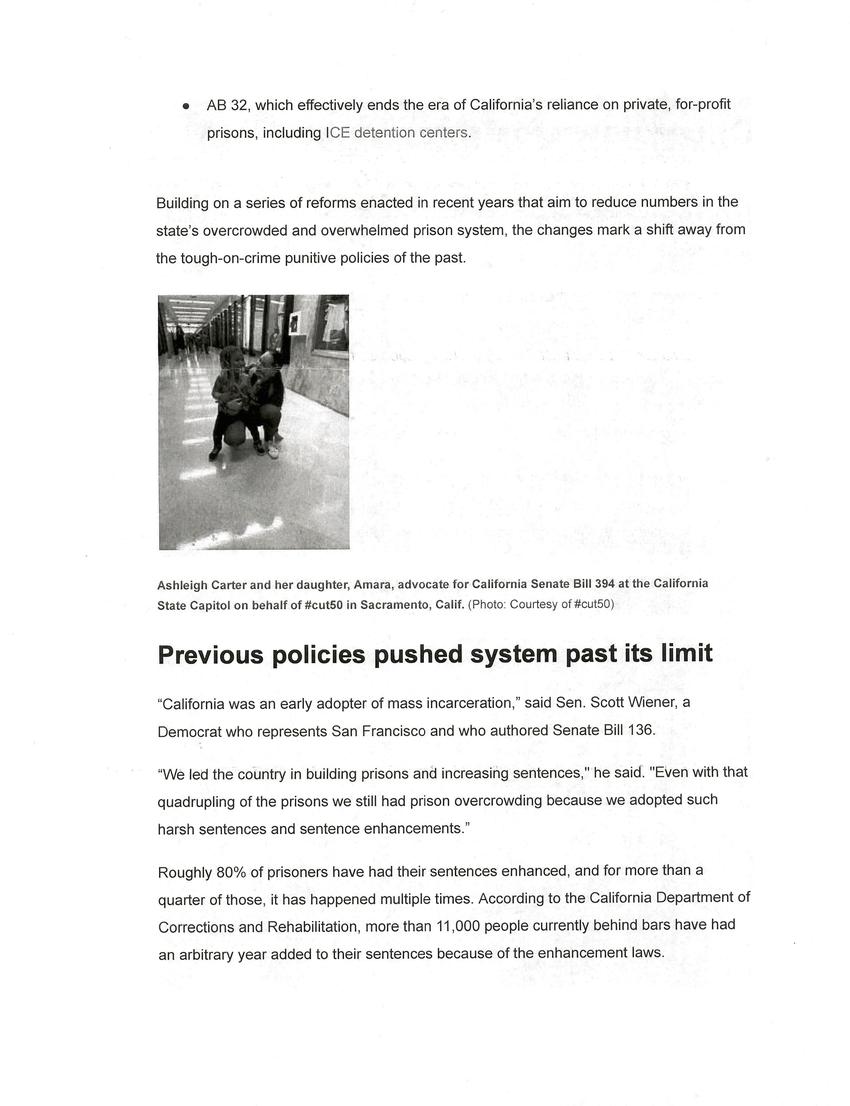

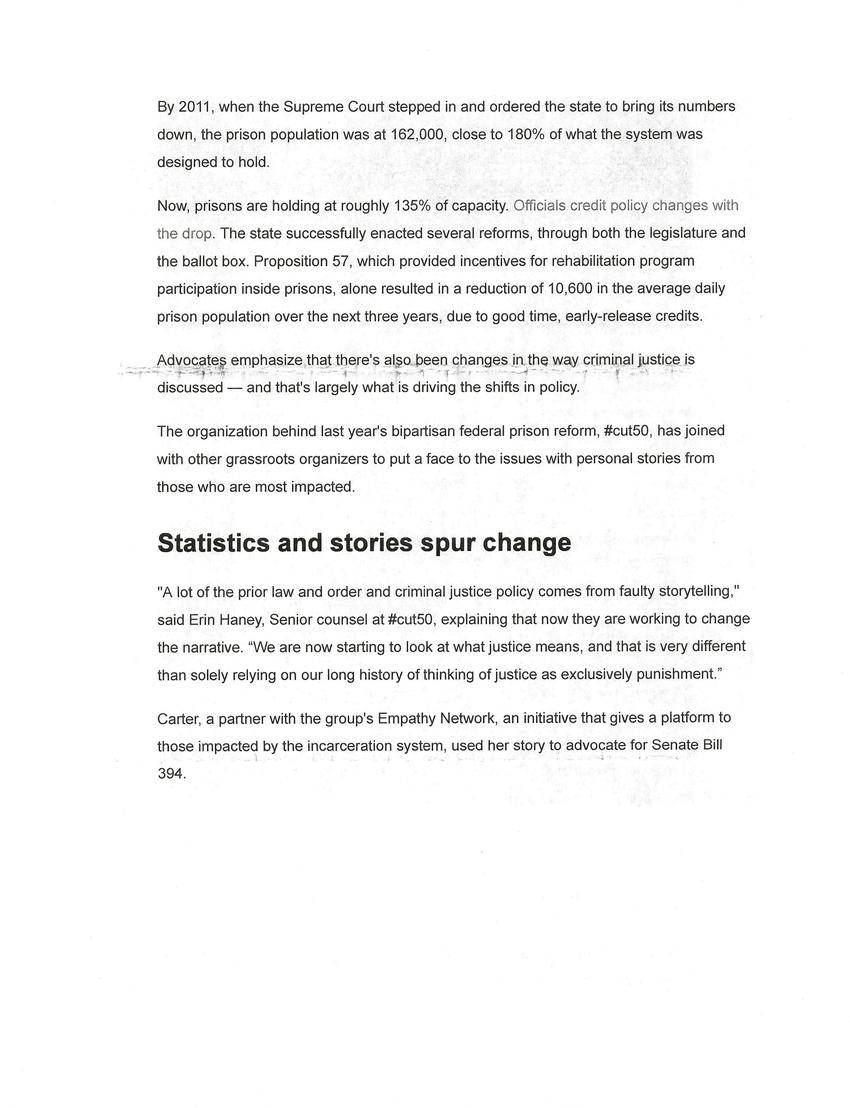
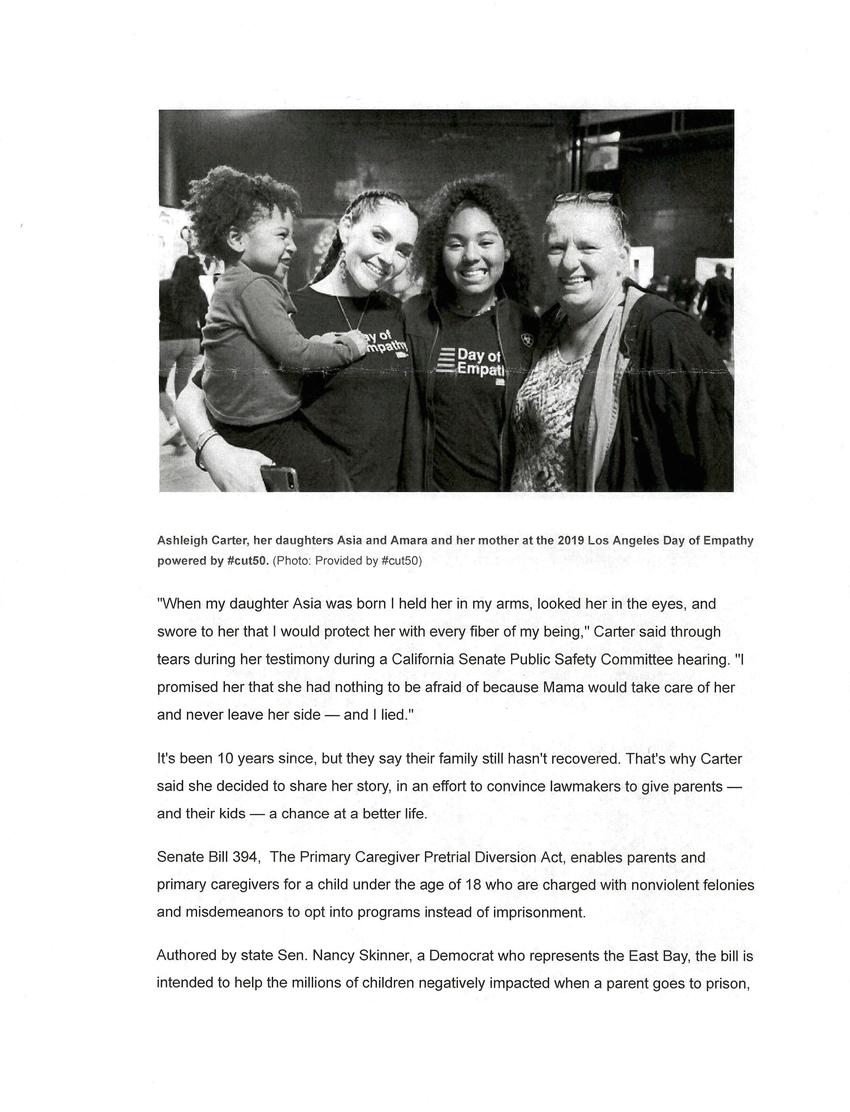
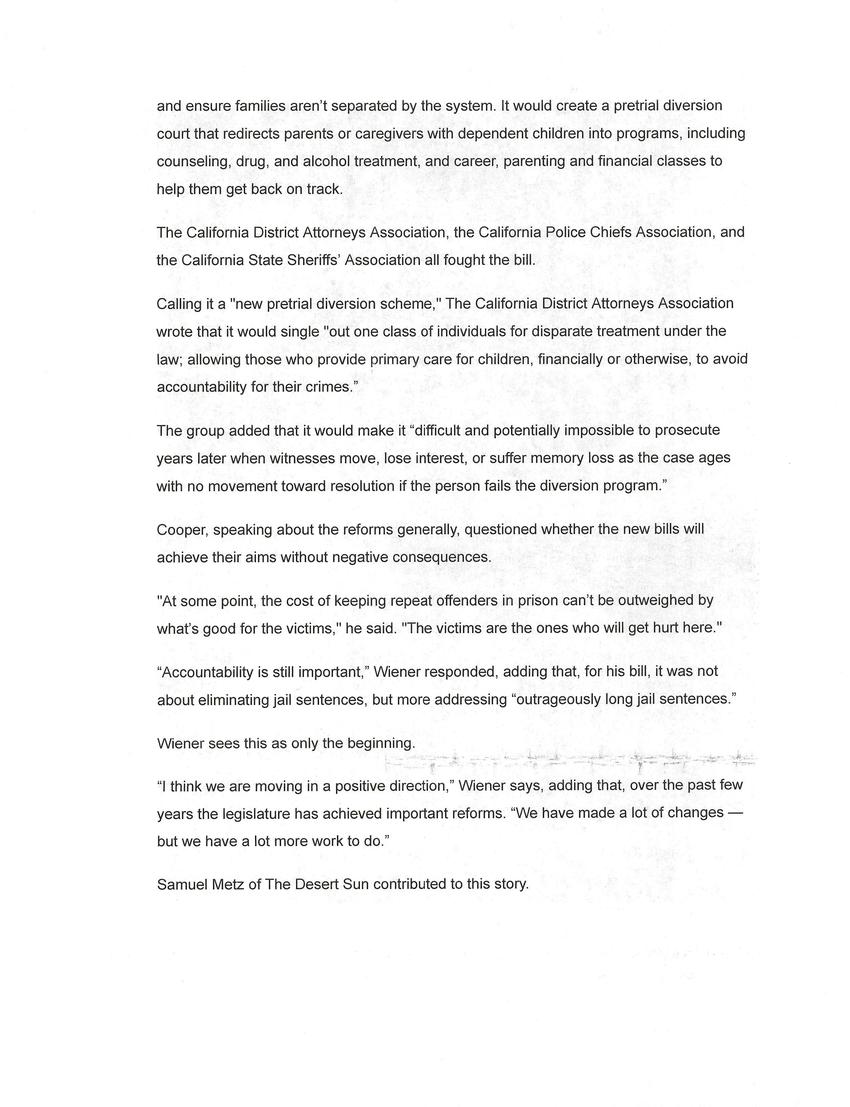
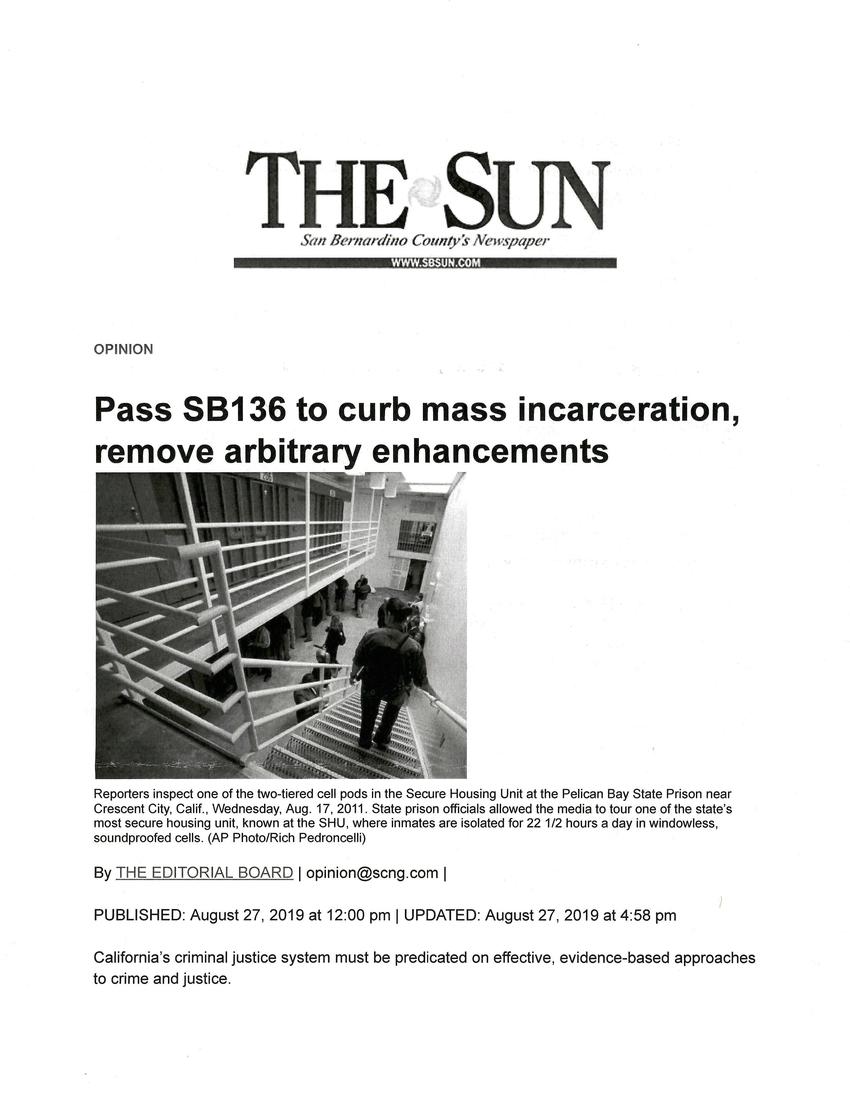
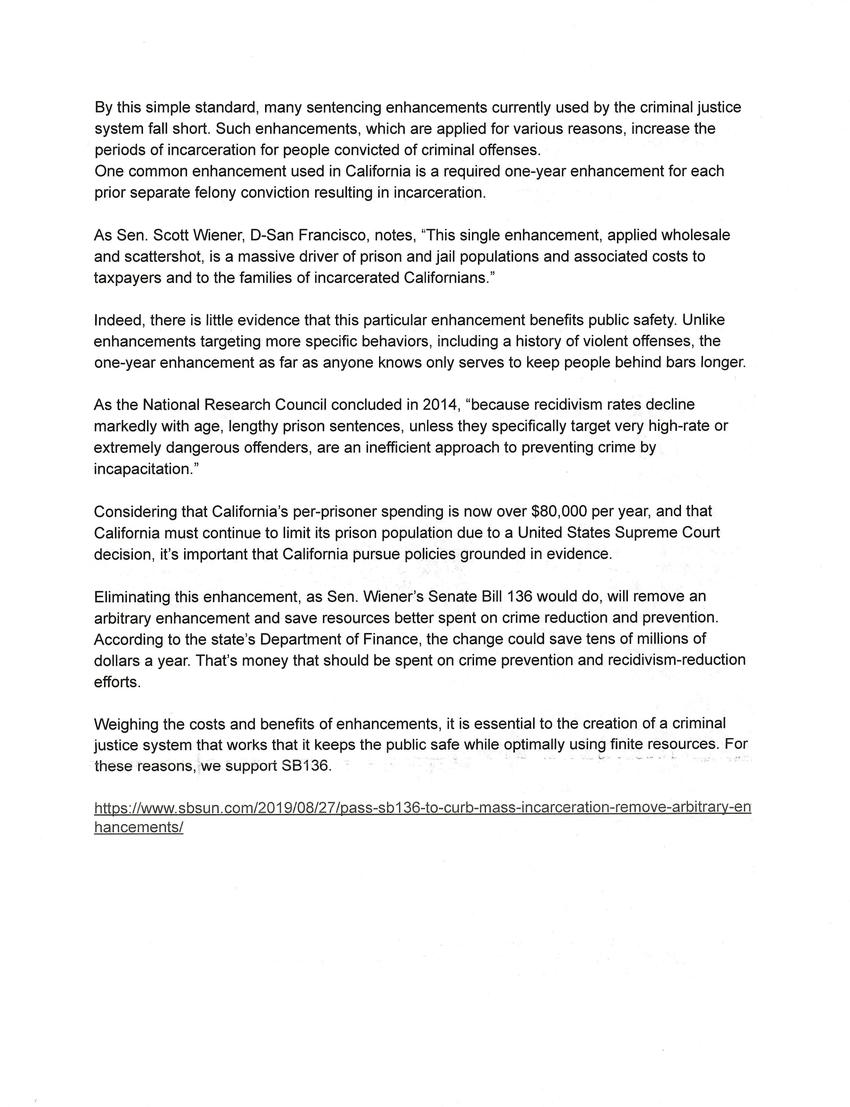
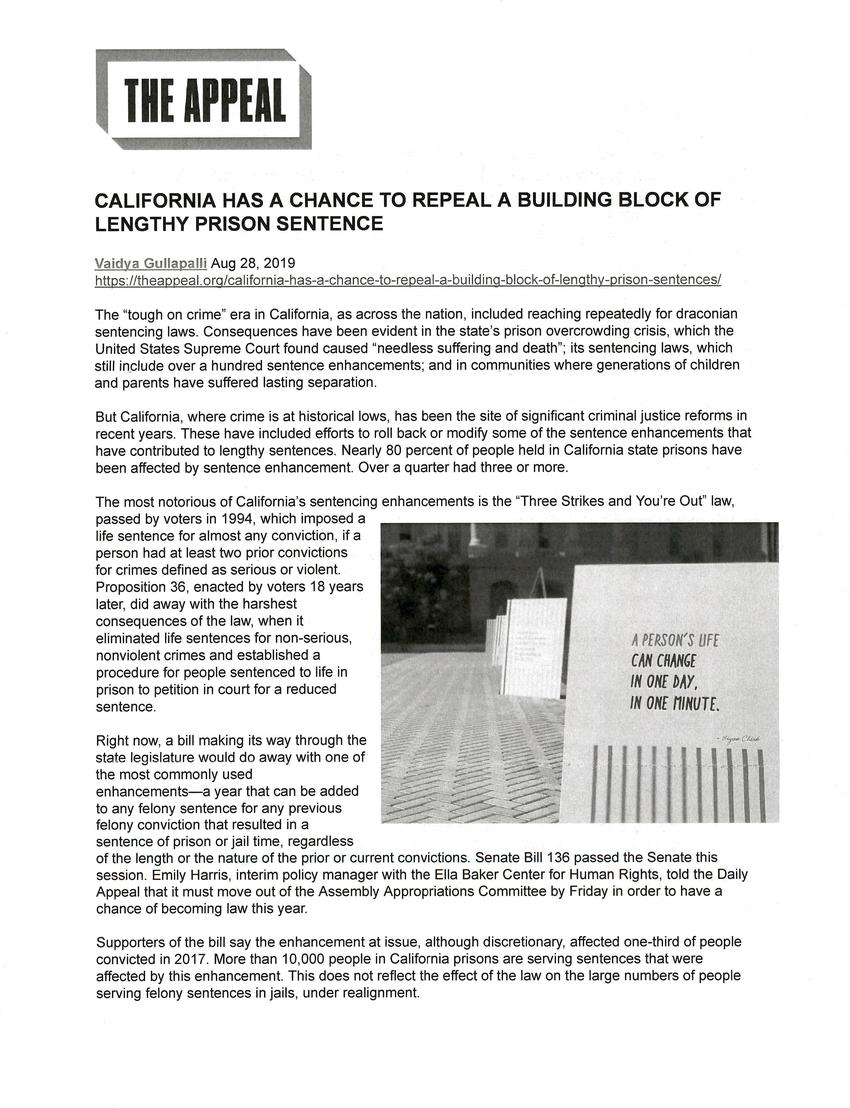
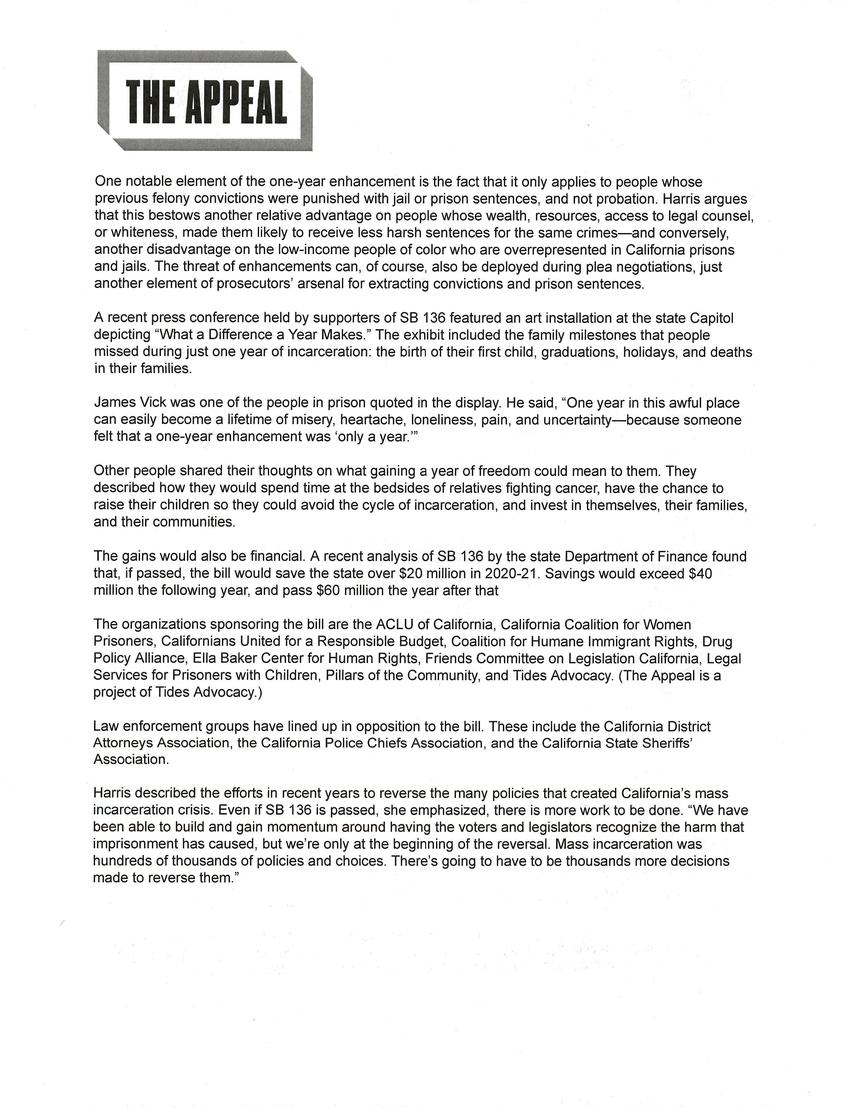

Replies